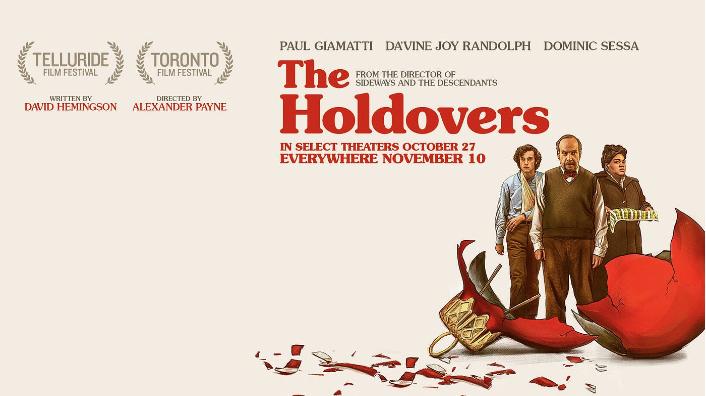Cinematography: 8.5/10
Costumes: 8.8/10
Sets: 9.7/10
Acting: 10/10
Special Effects: n/a
Character development: 10/10
“The Holdovers,” set in an idyllic New England boarding school filled to the brim with entitled wealthy boys, follows three people– a student, a teacher and the school’s head chef– as they are stranded at school over winter break. Each individual goes on their own unique and emotional “coming of age journey.” And all of them, as an ensemble of support, supply realism, tenderness and understanding.
Directed by Alexander Pane, written by David Hemingson and starring Paul Giamatti, Da’vene Joy Randolph and Dominic Sessa, the film grossed $19.3 million in box offices and was nominated for Best Picture, Best Original Screenplay and Best Film Editing. Paul Giamatti is also up for Best Actor for his role in the film, and Da’Vine Joy Randolph has been nominated for Best Supporting Actress. “The Holdovers” has a 97% on Rotten Tomatoes, which is practically unheard of in the film community, and is a testament to the film’s greatness.
“The Holdovers” deals heavily with the students’ sense of entitlement in the early 1970s. In a school primarily made up of upper-class white boys, you can practically see the ideals of privilege that they are born into. And yet, they are a mess. Class and race are also chipping away at the alleged solidity of this world. This is mainly to the credit of the film’s writer, whose script is beautiful, touching and very deserving of Best Original Screenplay. In particular, fifteen-year-old Angus Tully whose character development alone is Oscar-worthy. In two hours, he goes from an emotionally unavailable teenage boy to a lovable and heartwarming character, and by the end, you just want to get off your couch and give the kid a hug.
Paul Giamatti, who played Paul Hunham, completely embodied his role as an adult living in the shadow of his younger self. He’s a man with a secret. His acting has so much range, for example, there were scenes when he was completely dislikeable and then he would turn around and we would see this other side of him, filled with emotion and vulnerability. In the beginning, he was a grumpy old man with zero emotional connections to human beings, who hated that he was stuck teaching bratty careless kids. His character evolved into an empathetic caring teacher, who advocated for a student he only really got to know in two weeks. He will pay a price for his advocacy.
Mary, played by Da’vene Joy Randolph, the cook at the school, is such a strong, yet gentle character. She is grieving the loss of her son, who had been a student at her school, in Viet Nam. Sometimes she lets her guard down and it’s heartbreaking to watch, but then something reignites in her, often her care for Angus, and that sliver of hope returns. Her character teaches that even the people who seem strong can struggle, everyone deals with their own issues and the worst thing you can do is take out your pain on someone else.
In the early stages of the movie, each of the three main characters dealt with clashing individual problems. The characters aren’t able to make sense of their own lives, let alone help each other. If there wasn’t such a stigma around therapy and mental health in the 70s, they would all be talking to licensed paid professionals. Since they weren’t, finding each other ended up being the therapy they needed. All three of them helped each other in both subtextual and noticeable ways. For example, Angus’ insecurities surrounding his family leave him emotionally unavailable, but then at the end when Mary holds his hand, it’s a very subtle moment for his character that shows how much he’s grown. By the end of the film, she is a mother figure to him, and he finally has a shoulder to lean on when his biological family isn’t there for him.
The characters’ interactions with each other are the heart of the movie. Mary is a mother figure to Angus by the end, a full circle moment for her. She is the one to see the loneliness Angus struggles with and defends him to Mr. Hunham. However, Hunham isn’t one-dimensionally rude, he’s lonely too. He has his own troubled past, he deals with self-deprecation and lack of motivation and he regrets a lot of things he did when he was younger. Suddenly, here comes Angus who is lonely and desperately in need of a father figure, and as Angus loosens Mr. Hunham up, they begin to form a bond. In a word, “The Holdovers” is wholesome. At its core is the idea that sometimes family does not mean blood, rather found family is really the people you meet along the way.
It’s hard to describe the beauty in “The Holdovers” without spoiling the whole thing. It’s one of those movies that’s beautiful in a way that’s hard to put your finger on. Watching it reminded me of this concept of sonder, the realization that there are millions of people in the world with their own stories, their own problems, living their own lives. Sometimes, we get too caught up in our own lives to notice others and what they’re going through, but what this film taught me is if we pay attention, we can find similarities even with the people we least suspect.









